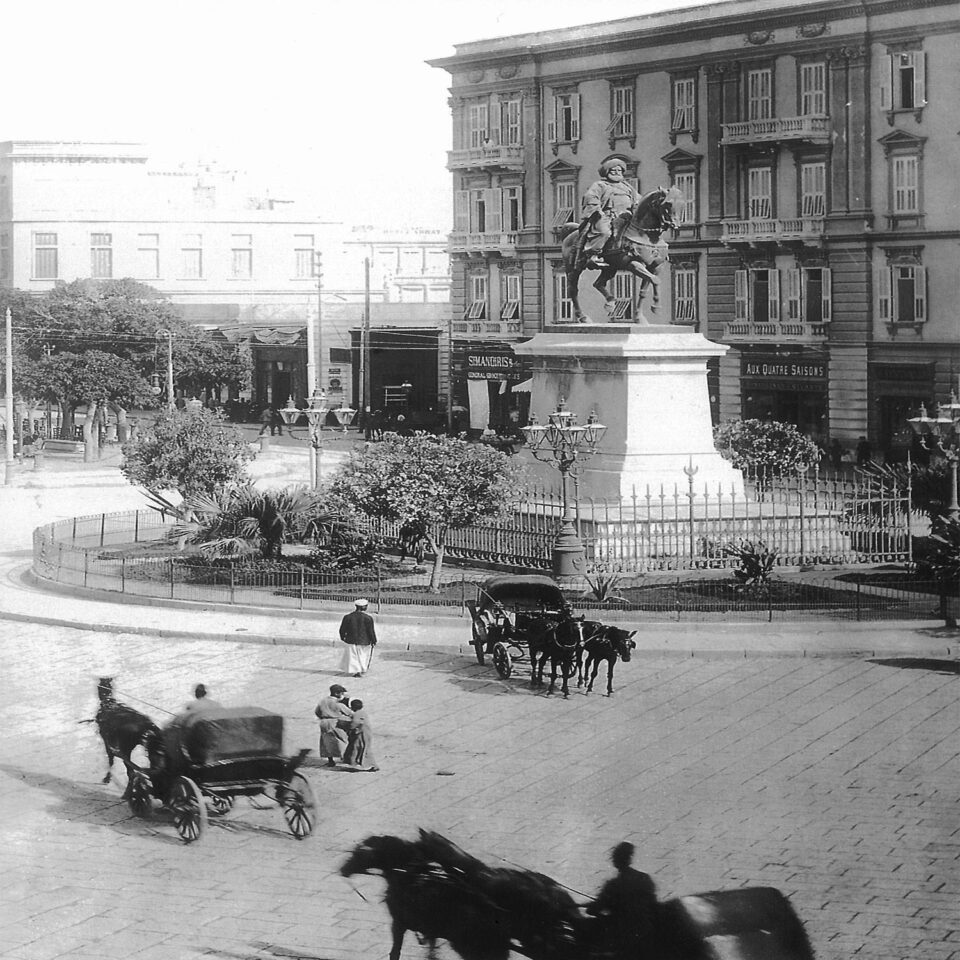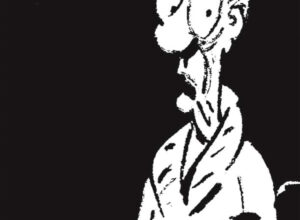Sahar stomped into the apartment slamming the door behind her, leaving only its echo in the deserted stairwell. Passing through the hall, she flung down her things keeping only the annoying envelope she had just that moment received. Once in the bedroom, she tossed it onto the bed and started undressing. However, her pain was provoked and inflamed by the envelope crouching there on the bed; things were dwarfed as it took on gigantic proportions looming over and overshadowing everything else. She debated taking a warm bath.
Braids of sorrow flowed under the force of the water. Once in bed, she could not breathe although she had not shrouded herself in the bedclothes but simply wrapped them loosely around her.
Tears welled up in her eyes unannounced; she fought them back to no avail. The envelope must be opened. A hastily scribbled note fell out; she grabbed it and avidly started to read,
Miss Sahar Galal,
Hope this finds you well.
I have been Mrs. Manal Naguib’s caretaker for the past three years. The dreaded disease has worn her out but she is still vibrant. She often says that masks are of no use at death’s door and how she wishes you would read what she has spent the past year writing. If you do not like it, tear it into little pieces and scatter it to the winds. Those are not my words but rather I borrow hers.
I promised her I would send you the manuscript as soon as she finished. She was planning to rewrite it for there is much to be added and much to be edited; however, her health is failing and she could not.
Regards,
Your Mother’s Nurse,
Amal Ibrahim,
Alexandria,
January 9, 2010
Lurking at the bottom of the envelope was a miserable notebook redolent of ancient Alexandria with a fragrance of age, memories, and the old house. Who deluded us into believing that our noses were less sensitive than those of dogs?
Oh mother, why drag up the past again? The question rose from the depth of her anguish. Today in particular, she had experienced a surge of triumph over the past. Her exhibition was a roaring success and her paintings were being sold like hotcakes. Her head was in a whirl. Hadn’t she made peace with the past? Hadn’t she left Alexandria to escape it?
Angry at the past, in revolt against it, it was clear as day that she could not break free of it unless she confronted it head on. She had not achieved her goal by escaping to Cairo, her doubts and misgivings had not been assuaged by her success. The past lurked between the pages of the notebook; this time she would confront it.
The idea appealed to her, she moved to her bed and by the soft lamplight, she started to read…
The mid-forties of the last century
Born in Alexandria on August 18, 1945, I was orphaned at the age of one. I have no knowledge of the circumstances and details of this event. E‘tedal Hanem, my maternal grandmother, forever avoided talking about the tragedy, and so I have lived my whole life in ignorance of it; knowing only that my parents died in a “horrific accident.”
There was no bond between us for I had never seen my parents, not even in a photograph. Their indifference never for once appealed to me. They brought me into the world then left as if nothing had come to pass. A fruit that bloomed then fell from the bough. Why care?
I got used to being an orphan to the extent that I considered it to be the norm, all else was the exception. Seeing children walking hand in hand with their parents, I would ask myself, “Can you have both a mother and a father at the same time? Can you love both? What if you prefer one to the other? It is said[1]A reference to doomsday as depicted in the Quran: (35) That Day shall a man flee from his own brother, (36) And from his wife and his children. (37) Each one of them, that Day, will have enough … Continue reading) that we will turn from them on Judgment Day. At least I will not be racked with guilt when I do so, am I not then better off?”
The answers forever eluded me. Whenever I felt really bemused, I sought refuge with my grandma who cocooned me in her Frenchness and soothed me with the fables of La Fontaine. I still recall how my granny’s Turkish roots had left their imprint; her gray hair was fine and flowing, her wilted green eyes betrayed the stubbornness with which she peered out at the world, while the plumpness and chubbiness of her face defied wrinkles.
I acquired none of her features. I stunned her with my dark complexion and jet-black hair. Once, I overheard her say to her friend, “If only she were a blonde, she would have a more fortunate life.” Her words scared me, and it was then that I started to peek out at life through those dark eyes of mine.
And so—in a vast flat in Fouad Street that had the air of the Elysée Palace—I crawled, stumbled, and walked towards womanhood and on my journey, it was essential that I be acquainted with the value of every item of furniture of French design as well as with the original paintings, the Gobelins, the bronze statues and the pure silver ornaments, the marble pillars and lofty mirrors, in addition to the Persian carpets in all their variety procured from Tabriz, Shiraz, Keshan, and Isfahan.
I got used to being an orphan
to the extent that I considered it
to be the norm, all else was the
exception.
Every item had a story, a history that my grandma recited over and over again in a tone of awe as a tribute to my deceased grandfather who had bought most of these treasures from Christie’s and Sotheby’s in London, from antique shops near the Louvre in Paris, and even from auction houses in Egypt. These stories were followed by a recital of the fatiha[2]The opening verse in the Quran often recited for the dead.and repeated murmurs of, “May God rest his soul,” which she regarded as the fitting finale for his good deeds.
By and by the matter took on absurd proportions as my grandma became increasingly obsessed with her precious heritage. She would take me on weekly rounds of her possessions, point to a particular piece, and I had to reel off its value and history.
Time passed, I began to roam alone amidst this opulence of culture. On tiptoe, I would try to raise my little head in order to peep at the place; I would lose my balance keeping a grip with my feet then bow down crushed by the inadequacy of my height. I think that is the main reason for my passion for paintings and statues; from a very young age I believed in the grandeur of these treasures due to their lofty position and my grandma’s excessive pride in them, not to mention her constant care in cleaning and maintaining them. She was my role model; I saw the world through her eyes and followed in her footsteps.
It reached the stage that when she went to sleep, I would steal into the sitting room to sit in her comfy chair and impersonate her. I would clasp her walking stick, wrap myself in her shawl, and gaze at the paintings on the walls just as she did. The whole process required time and effort; climbing into the chair, slipping off it, and falling were all essential steps that necessitated a number of attempts. When I finally succeeded, I would assuage my fears in its warm, silky velvet. My gaze would wander round the wealth of creativity accompanied by the ancient fireplace to help decipher the mysteries. At times, the firelight would dim, clothing the paintings in garments of faith and devotion; at others it would flare up and those selfsame paintings partook of harlotry and dissipation. The firewood would crackle, hurling curses at those faces, those paths. It was a language I perfected as those evenings slipped by.
At the age of seven, I abandoned the nightly forages; instead I withdrew to the eastern side of the apartment where my granny’s studio lay. Art did not play havoc or cast a bohemian shadow over things. The studio emulated the cosmic order; tubes of oil paint, palettes, and brushes of every size occupied two large tables to the right of the room; the easels stood at the left, and the canvases on their wooden frames stood at the north end of the room, while the walls embraced classicism, for this was one of her dogmas that were not to be messed with.
Enveloped with the sacredness of the altar, the scent of oil, turpentine, and paints inspiring her, shrouded in her shawl, my granny would with her brushstrokes chant her inspiration into paintings.[3]An analogy to Prophet Mohammed who folded himself in garments when he received enlightenment in the cave of Hira’. (Quran 73)

When I crept between her legs, she would sometimes glance at my creations and stroking my hair, would proudly exclaim in Turkish, “Çok güzel,” for this is how Ottomans praise beauty.
Being a pupil took up a large
portion of my childhood.
I began to draw anytime, anywhere without being restricted by the timings of the studio. I adored drawing so much so that I thought it gave me license to be creative on anything, and for a while, I was oblivious to the rules. One day, I had the bright idea of drawing lines and shapes on my body and coloring them in. As soon as I finished, I flew off to get my granny’s blessings. She scolded me, “The rules and regulations of drawing are there to be respected, or else we would turn into clowns,” she said. I hung my head in shame for I had forgotten the cosmic order. Once in the bathroom, I poured water over my body to absolve myself of guilt.
When I was eight, I began to help her spread the canvas on the wooden frame, fasten it with nails, and coat it with glue, zinc, and powdered chalk so the colors would not be absorbed. For all her escapades with fiberboard, cardboard, and plywood, canvas remained her favorite medium; her brushes forever thirsted for its touch. And down the path of colors, she shepherded me till I came upon their heat, their frost, and the blend, and I learnt to mix them with turpentine or linseed oil, to dilute or to create a chunky effect on the painting. By and by, human complexion, which is the most difficult for any artist, became the easiest of colors for me. And between the various sizes and types of brushes and knives, I stumbled around till I got into my stride.
Children sang and swung down distant paths, their shouts becoming increasingly remote to my ears.
The early fifties
Being a pupil took up a large portion of my childhood. I will forever be that outstanding student at the French nuns’ school to which my granny sent me. She would attend every monthly meeting to hear my teachers and the nuns sing my praises. This felt like the only repayment I could bestow upon her, so I chose never to stick up for my rights to avoid any trouble, and in the evenings, I would escape to the studio where I would turn to my paintings in boredom and defeat.
In that traditional Catholic school, I was raised and educated. When we ate, we ingested principles, and when we spoke, we kept our voices down. We were over-careful of our neatness and cleanliness for our nails and hair were inspected publicly every day to make sure they were clean and free of insects. When we sat, we did so with our legs firmly together, and when we coughed, we clasped our hands over our mouths. When we shook hands with an adult, we curtsied graciously, and at all times, we politely asked permission or expressed gratitude. When we went to class, our hands were crossed behind our backs and we walked along the black lines on either side of the corridors. We had to always walk in groups, it was a total taboo for us to walk in couples because then the devil would walk between us. Even our handwriting fell prey to the same fascist regime. The curves and swirls of our writing were suppressed to the point that distinguishing between students’ copybooks became a distant fantasy.
We clapped fervently for those who came top of the class, less so for those who got a “very good,” with two fingers for “good,” and bowed our heads in silence when the report cards of those stigmatized with a “pass” were being handed out.
A girl was expelled. Gossip was rife. Word went round that she had committed an abomination. The rot must be removed or it would contaminate the rest of the fruit.
“Isn’t this your land?” I asked in
wonder. “It used to be. Not any longer.”
During our weekly lesson when we worked out the issues of life, we were informed by the nun that the girl had been caught chewing gum. This was a grave transgression, we were told.
I remember being very different from my classmates. Their games and stories held no interest for me, so I detached myself from their world and roamed alone in my own paradise. I would follow the colonies of ants in the schoolyard, watching them flee to their holes terrified by the sound of the girls’ footsteps. In the meowing of the stray cats I befriended, I heard the cadence of a flute. I would ponder the fallen leaves gathered on the ground, awestruck by their colors and forms. I was filled with pleasure by the creativity of the shapes formed by the trunks and twisted branches of the trees I communed with. The white clouds shaped by Aeolus—Greek god of the wind— enchanted me when I gazed at the sky.
Often, I crept to the back fence of the school where there was a densely fronded tree with dangling twigs that looked like long worms in which the howling wind got entangled and muted to a mournful moan. The immense casuarina tree was not as colorful as the others. Its green was faded while its wailing aroused the very fear of life. I approached it apprehensively and listened in awe for I was absolutely certain that it imparted the omens of life, although never once did I manage to unravel the mysteries it imparted to me. Never once did I call it malevolent but rather regarded it as deeply rooted while its branches touched the sky.[4]Refers to a Qur’anic parable: (24) Seest thou not how God sets forth a parable? A goodly word like a goodly tree, whose root is firmly fixed, and its branches reach to the heavens. (Quran 14: 24)
Those times of contemplation and reflection had serious consequences. My face was often swollen from walking into buildings and fences while my clothes were dirty from falls I took into muddy puddles.
Once, a crow snatched a girl’s food. They called it a thief and conspired to beat it. I started arguing with them. “Maybe it was hungry,” I said. “Why’s it taking our food? Are you sticking up for the crow?”
“Didn’t it teach Cain how to bury his brother?”[5]Refers to the story of Cain in the Quran: (34) Then God sent a raven, who scratched the ground, to show him how to hide the shame of his brother. “Woe is me!” said he; “Was I not even able to … Continue reading)
The gap between us widened for they were now certain of my eccentricity.
One day, I walked straight into Stephanie, a blonde, Greek girl with the same hobbies as myself. We were floating among the cloudy paintings of the sky when we literally fell into each other’s arms. We became friends for a long span of time. Our communication was more through glances rather than words. She would notice a tree, and we would see autumn in its dried leaves; I would admire buds blooming amongst the shrubs and we would foresee the advent of Paremhat[6]Also known as Baramhat, is the seventh month of the Coptic calendar. It lies between March 10 and April 8 of the Gregorian calendar. with all its reddish-purple splendor. When the rain fell, the girls ran indoors but we would circle round the center of the schoolyard thus honoring the downpour. We embraced it with our plaits and our bosoms; we cupped our hands to catch it and get drunk on life. The loud claps of thunder had us dancing to their tune; we wondered how the Greeks could have believed it to be the embodiment of the fury of Zeus, king of the gods.
We spent time watching a beautiful, solitary hoopoe strutting about the grass and trees. We wanted to befriend it but it did not like the idea and instead busied itself with plucking the riches of the earth. Apparently our friendship had undesirable consequences, for then it may have to acquaint us with the unknown, and we were neither the righteous nor were we prophets.[7]An analogy to the Qur’anic story of Solomon and the hoopoe. (Quran 27) She started talking of emigration to the land of Aeolus, for it was her homeland.
“Isn’t this your land?” I asked in wonder.
“It used to be. Not any longer.”
At the time I did not understand how one’s homeland could become an exile but sensed that I would miss her once she began communicating in words. Our silence used to spell peace. Then she was gone. The separation hurt for, in my solitude, she had often kept me company. I went back to contemplating the clouds alone but could smell the scent of her breath on the breeze that came from Greece. She too must have been contemplating the clouds at the same time.
Dina Abdelsalam, A Text Abandoned by its Characters. Cairo: Beit al-Yasmeen, 2012.
References
| ↑1 | A reference to doomsday as depicted in the Quran: (35) That Day shall a man flee from his own brother, (36) And from his wife and his children. (37) Each one of them, that Day, will have enough concern (of his own) to make him indifferent to the others. (Quran 80: 35–37 |
|---|---|
| ↑2 | The opening verse in the Quran often recited for the dead. |
| ↑3 | An analogy to Prophet Mohammed who folded himself in garments when he received enlightenment in the cave of Hira’. (Quran 73 |
| ↑4 | Refers to a Qur’anic parable: (24) Seest thou not how God sets forth a parable? A goodly word like a goodly tree, whose root is firmly fixed, and its branches reach to the heavens. (Quran 14: 24 |
| ↑5 | Refers to the story of Cain in the Quran: (34) Then God sent a raven, who scratched the ground, to show him how to hide the shame of his brother. “Woe is me!” said he; “Was I not even able to be as this raven, and to hide the shame of my brother?” Then he became full of regrets (Quran 5: 34 |
| ↑6 | Also known as Baramhat, is the seventh month of the Coptic calendar. It lies between March 10 and April 8 of the Gregorian calendar. |
| ↑7 | An analogy to the Qur’anic story of Solomon and the hoopoe. (Quran 27 |









